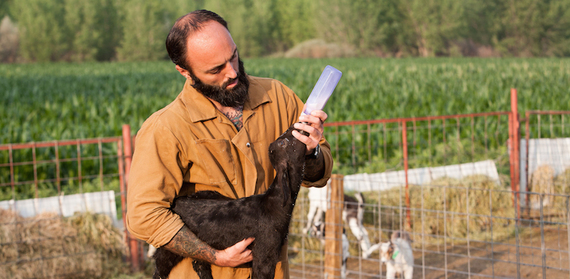Written by Laurel Miller
A recent Fortune story on a Colorado prison-run goat dairy has tapped into a socially sensitive nerve, if today's response by Jezebel writer Kelly Faircloth is any indication. Fortune writer Jennifer Alsever's June 2 story on the Skyline Correctional Center goat dairy, located in the East Cañon Correctional Complex in Cañon City, Colo., provides a brief look into the burgeoning business of specialty and agriculture-related correctional industry programs.
In this instance, the goat dairy in question produces milk for Haystack Mountain Goat Dairy, located three hours away in Boulder. The main source of Faircloth's ire appears to be what she considers an "ethical problem." In Faircloth's defense, while Fortune's is a positive profile, Alsever misguidedly portrays inmate programs as superficial, stating, "Prison labor has gone artisanal... But in recent years a new wave has begun, driven primarily by small businesses that need workers for boutique-size production."
Anyone who has ever actually set foot inside a prison, or visited a correctional industries program, knows that "artisanal" and "boutique" are inaccurate portrayals of the work environment for inmates, regardless of the type of work they're doing. That misconception, paired with the resulting ignorant Jezebel article, has created a negative social media flurry regarding correctional industry programs. This is what motivated me to write a response.
In 2012, I wrote a feature for culture on the Skyline goat dairy, which included spending a day at the complex with Colorado Correctional Industries (CCI) director, Steve Smith, who is quoted in the Fortune piece. I also conducted in-person interviews with inmates participating in the program, as well as with Haystack's president/general manager Chuck Hellmer. As a former Boulder resident and cheese writer/consultant, I was familiar with Haystack Mountain's milk sourcing and production methods, which is why I pitched the story to culture.
There are multiple issues I have with the coverage in the Jezebel piece. In this post, I'll focus on Faircloth's major beef, in which she says, "The trend (of "artisanal foods") has so thoroughly infiltrated America that now, prison inmates are passing their time milking goats, helping produce cheese that'll ultimately be sold at Whole Foods." She goes on to snark:
"On the one hand, these jobs do offer prisoners the chance to acquire some skills and earn a little cash. Smith insisted he turns down companies simply shopping for dirt-cheap labor. Plus goat-wrangling probably counts as a pleasant diversion when you're in the slammer... and where exactly are inmates supposed to apply these new goat-milking skills in their post-prison lives? Not sure that's a real growth industry."
If Faircloth thinks cheesemaking, milking, and herd management aren't "growth industries," and are nothing more than "pleasant diversions" she should probably go spend a day at a dairy, or at least conduct a quick Google search on domestic artisan cheesemaking. As many culture readers know, it's time-consuming, never-ending, repetitive, laborious work, much of it requiring advanced knowledge of microbiology. Inmates involved in the Skyline dairy program aren't spending their days swirling wine and snacking on chèvre. They're busy earning dairy technology certificates, which -- for many of them -- will lead to gainful, skilled employment after their release. If nothing else, the experience helps them learn to be responsible, and how to nurture other living creatures, as well as better themselves.
As for Haystack's role in the program, the company is to be commended for helping to implement what is a completely symbiotic relationship. After founder Jim Schott retired and sold his land and goats in 2008, Haystack didn't have the necessary supply of consistent, high-quality milk. Smith approached them with the idea of constructing a goat dairy, if Haystack would commit to purchasing (below cost) all of the milk. The solution wasn't based on cheap labor or product. Instead, as Hellmer explained to me, it was based on good animal husbandry, quality raw ingredients, and (admittedly) financial viability/sustainability. Neither could exist without the other, and having visited prisons myself, while I must admit there are differences in how inmates are perceived, the value of animal-assisted correctional industry programs is indisputable -- especially at a time when few farmers can afford their own land, and leases are lost due to development.
I have interviewed dozens of inmates who work in these programs. While each has his or her own reasons for applying, those who aren't dedicated to the job are transferred. Admittedly, every correctional facility has its own agenda, and not all are as invested in the welfare of their inmates, but the bigger picture is that Faircloth knows not of what she speaks when she suggests CCI's goat dairy and other correctional industry programs are "exploitative." The world is not so black-and-white. Inmates do have rights, and when those aren't met, events like riots and hunger strikes occur. There is much in the public and privatized correctional system that needs improvement, but that's not the subject at hand.
While not every inmate who participates in a correctional industries program -- animal-assisted or otherwise -- is going to stay out of prison or lead a productive life, what's the alternative? These men and women are serving time, and it behooves them -- and us -- to give them the means to spend that time productively, both physically and mentally. If it benefits yuppies shopping at Whole Foods or bamboo fishing-rod aficionados on the side, does it matter? As Smith told me, "Ninety-seven percent of inmates are going to be released. Do we want them to have the tools to be successful, and for them to have vocational credits and a work ethic?" I think we know the answer.
If this discussion piques your interest, please read my other post about the benefits of animal-assisted programs.
